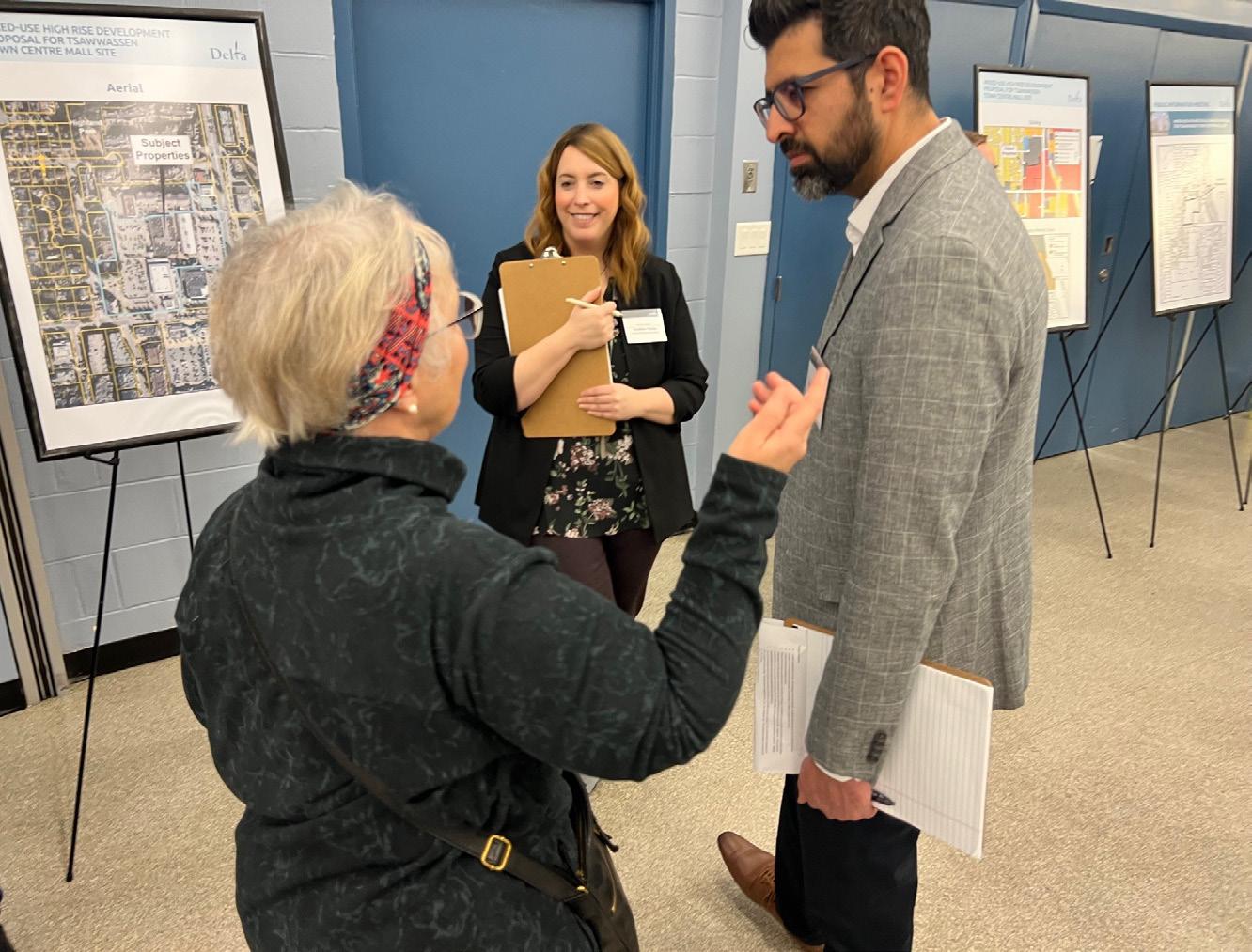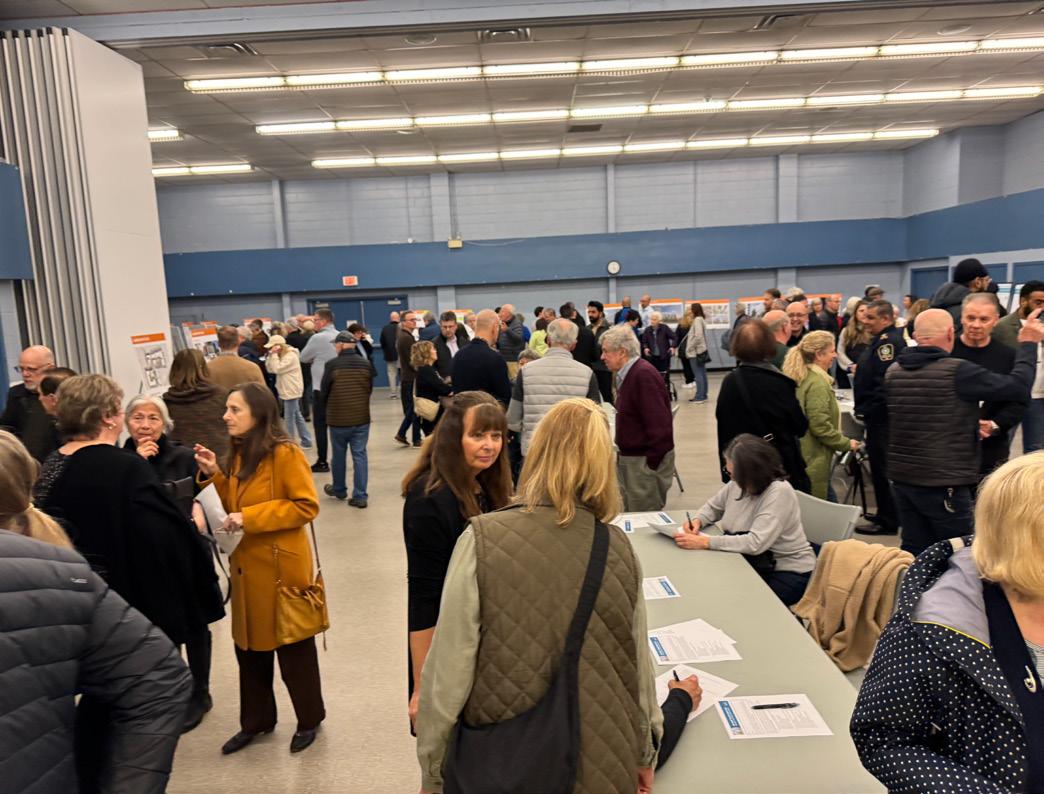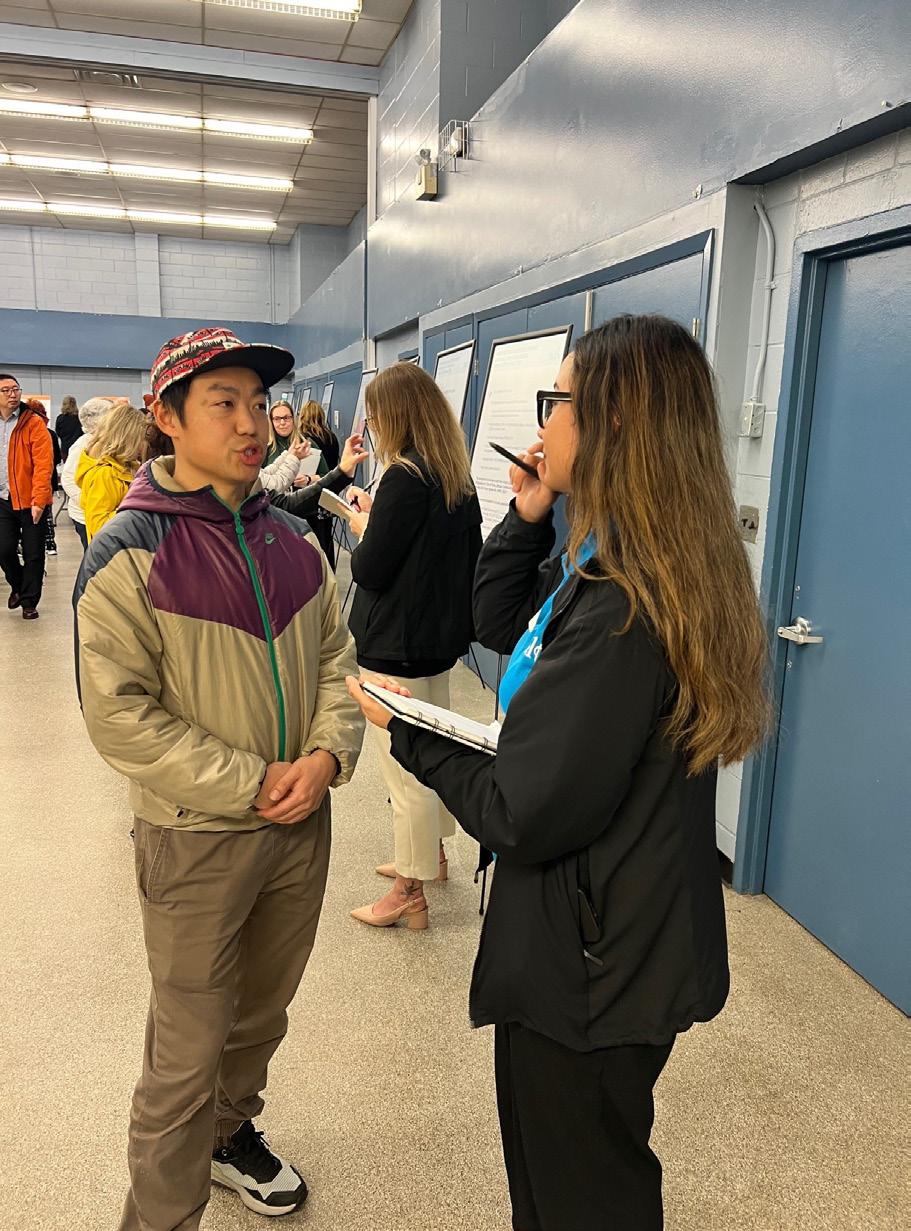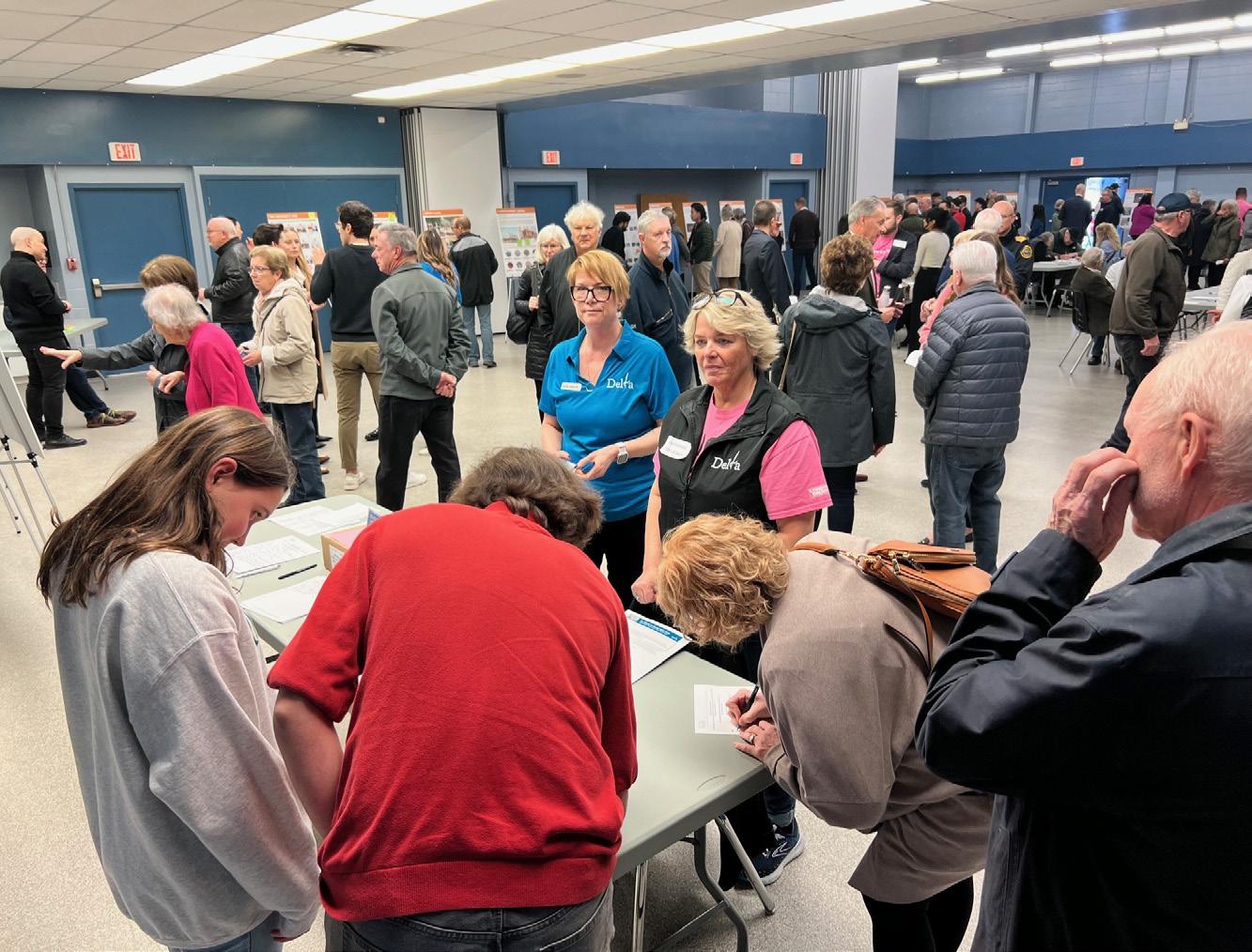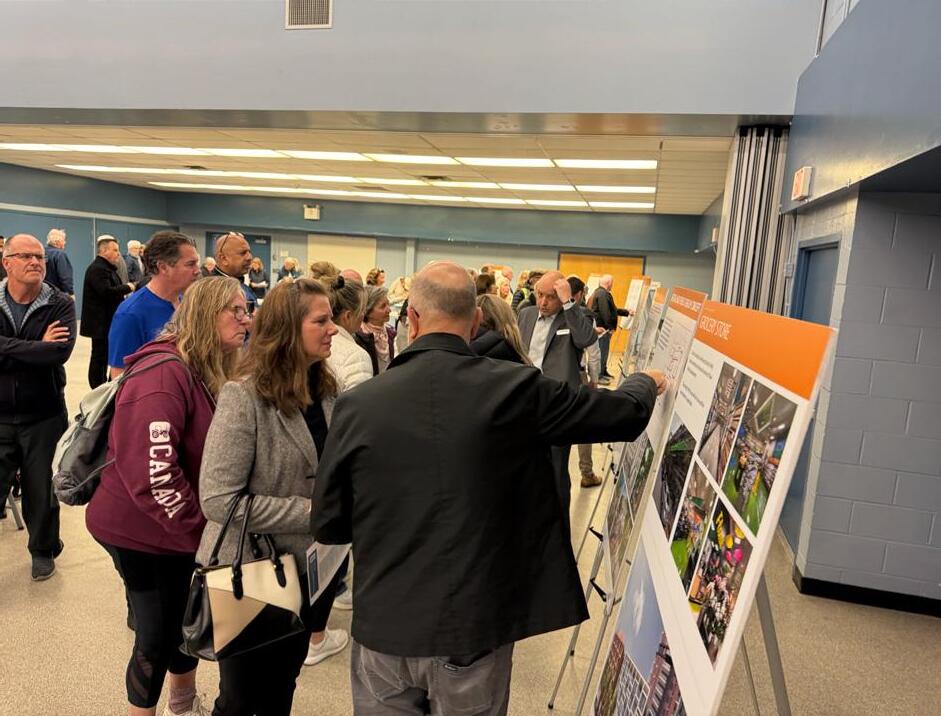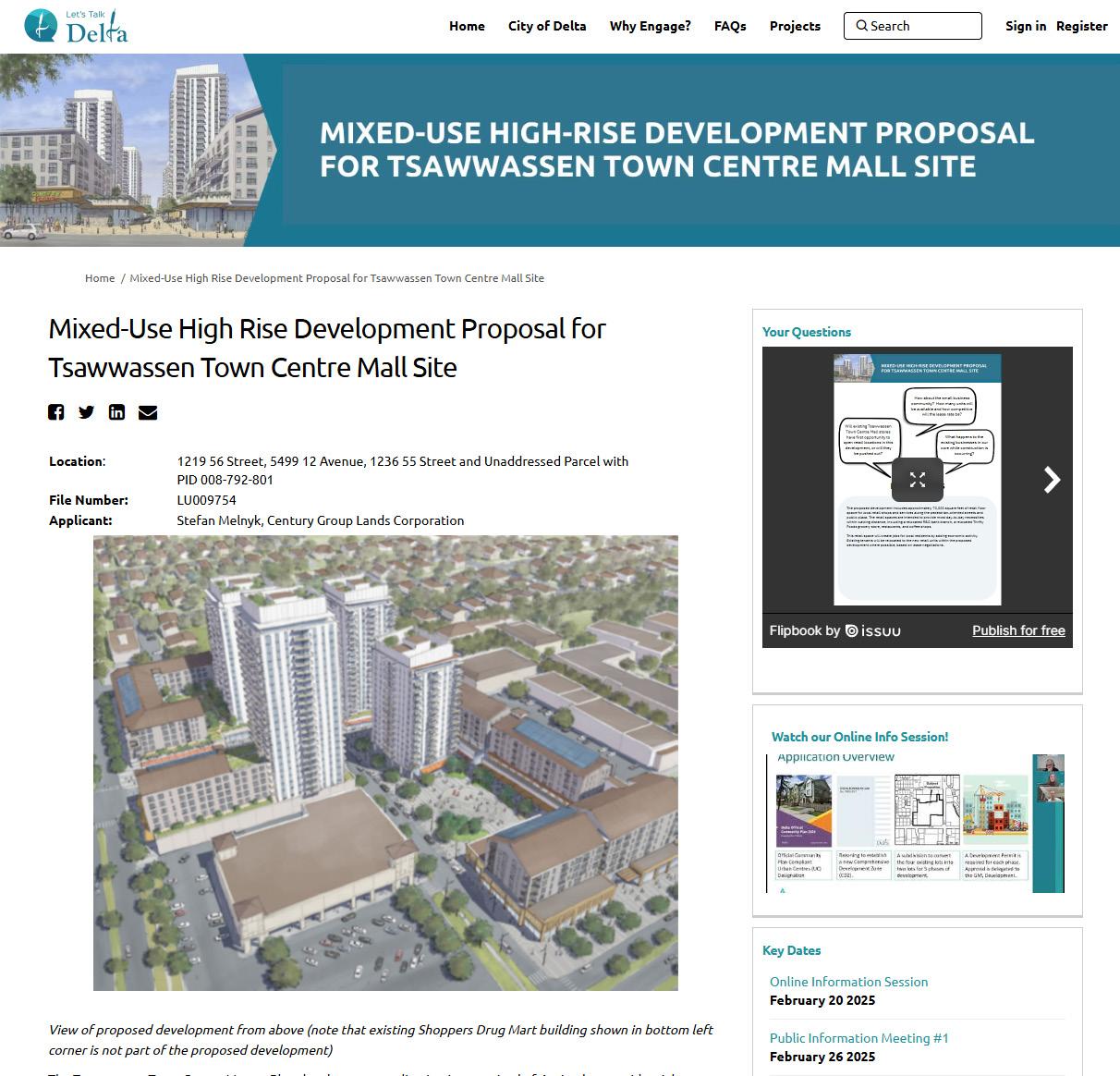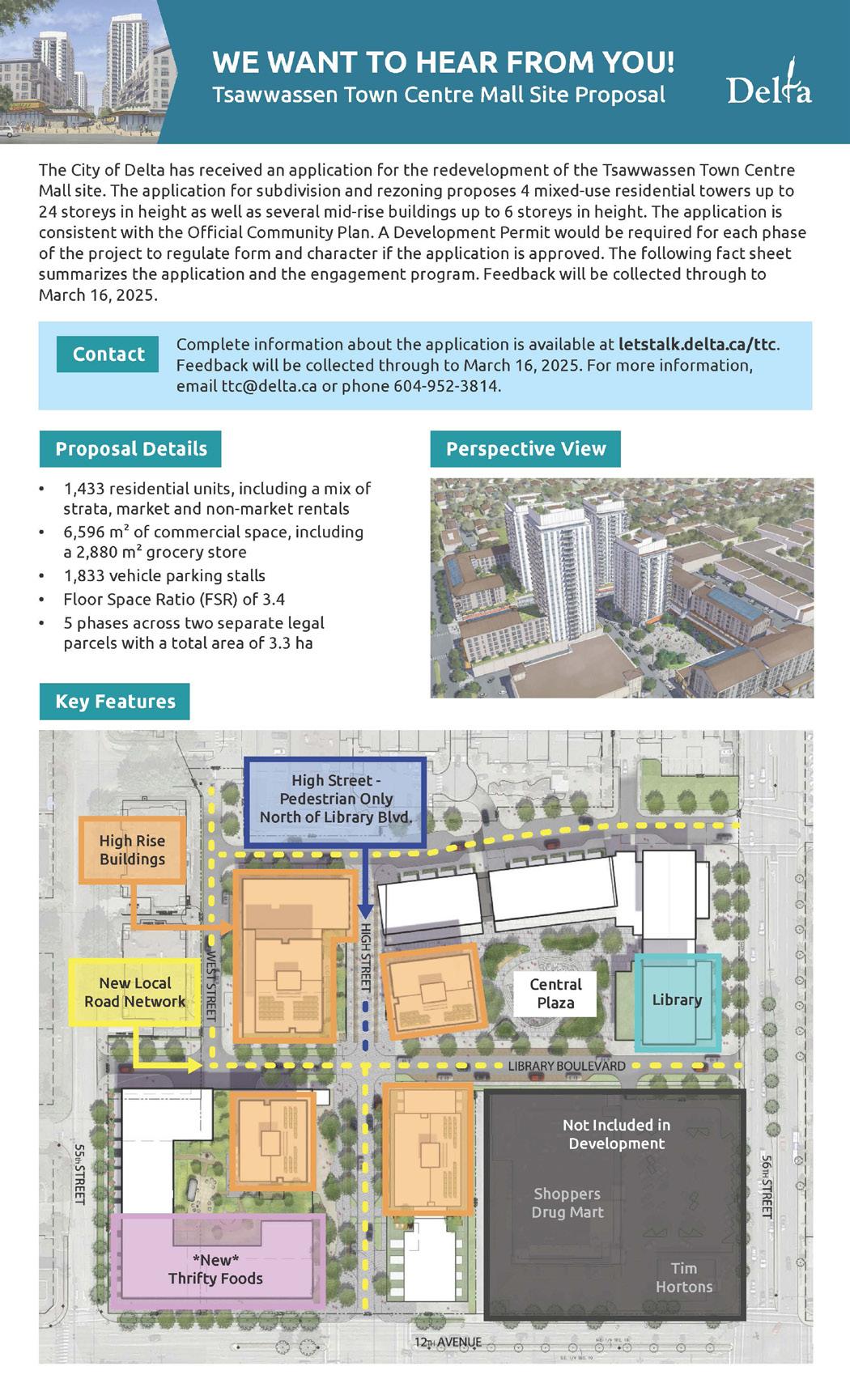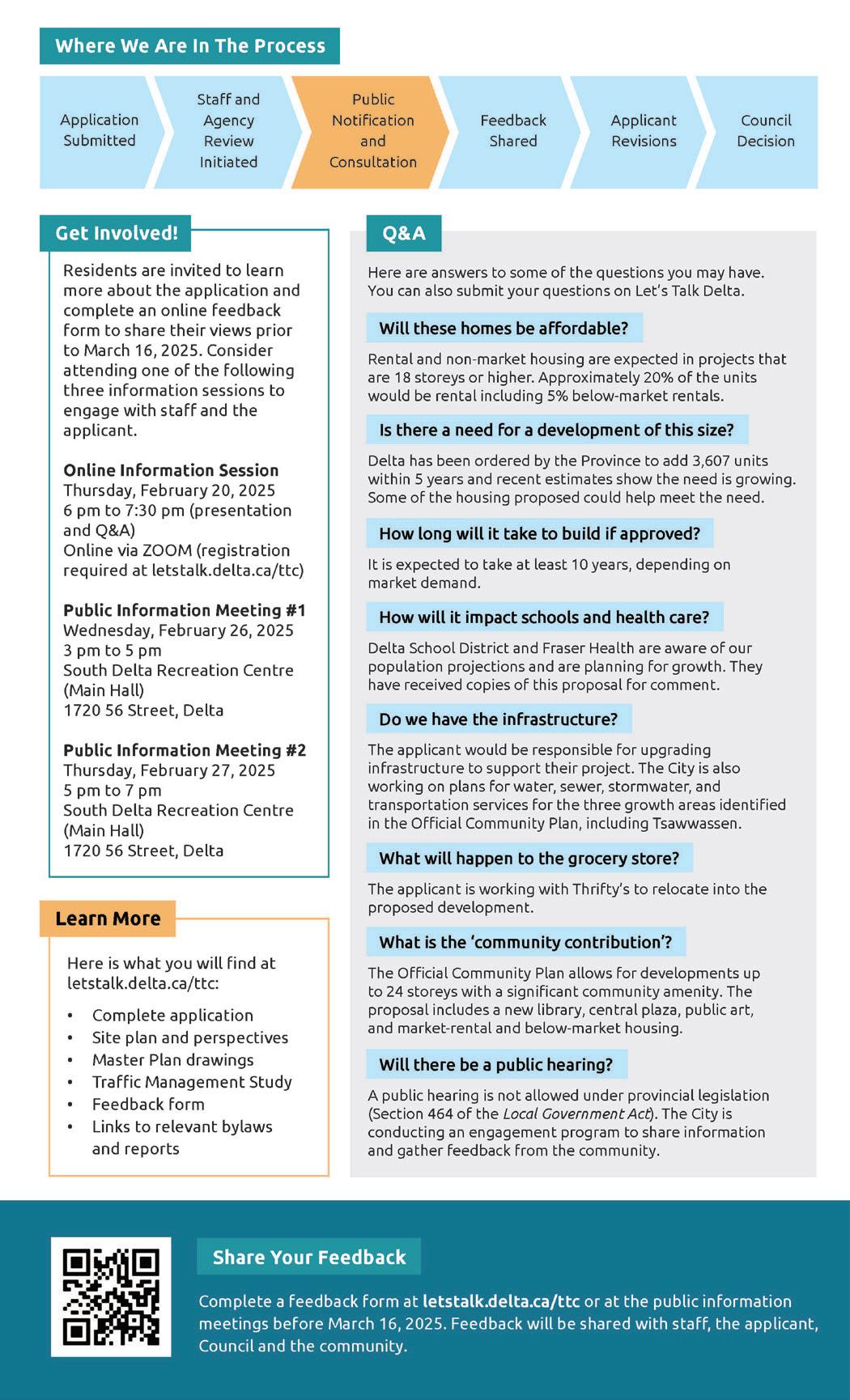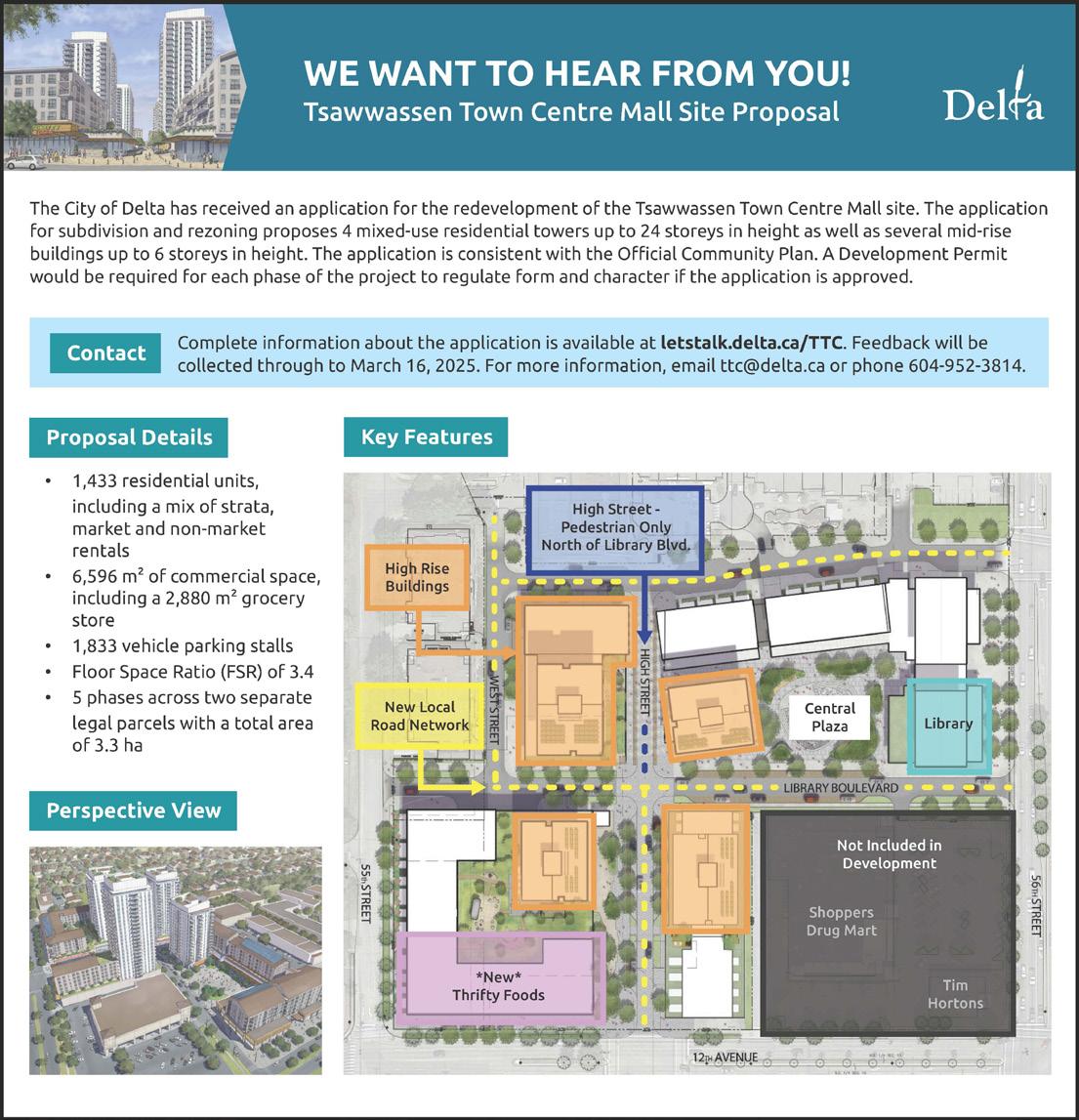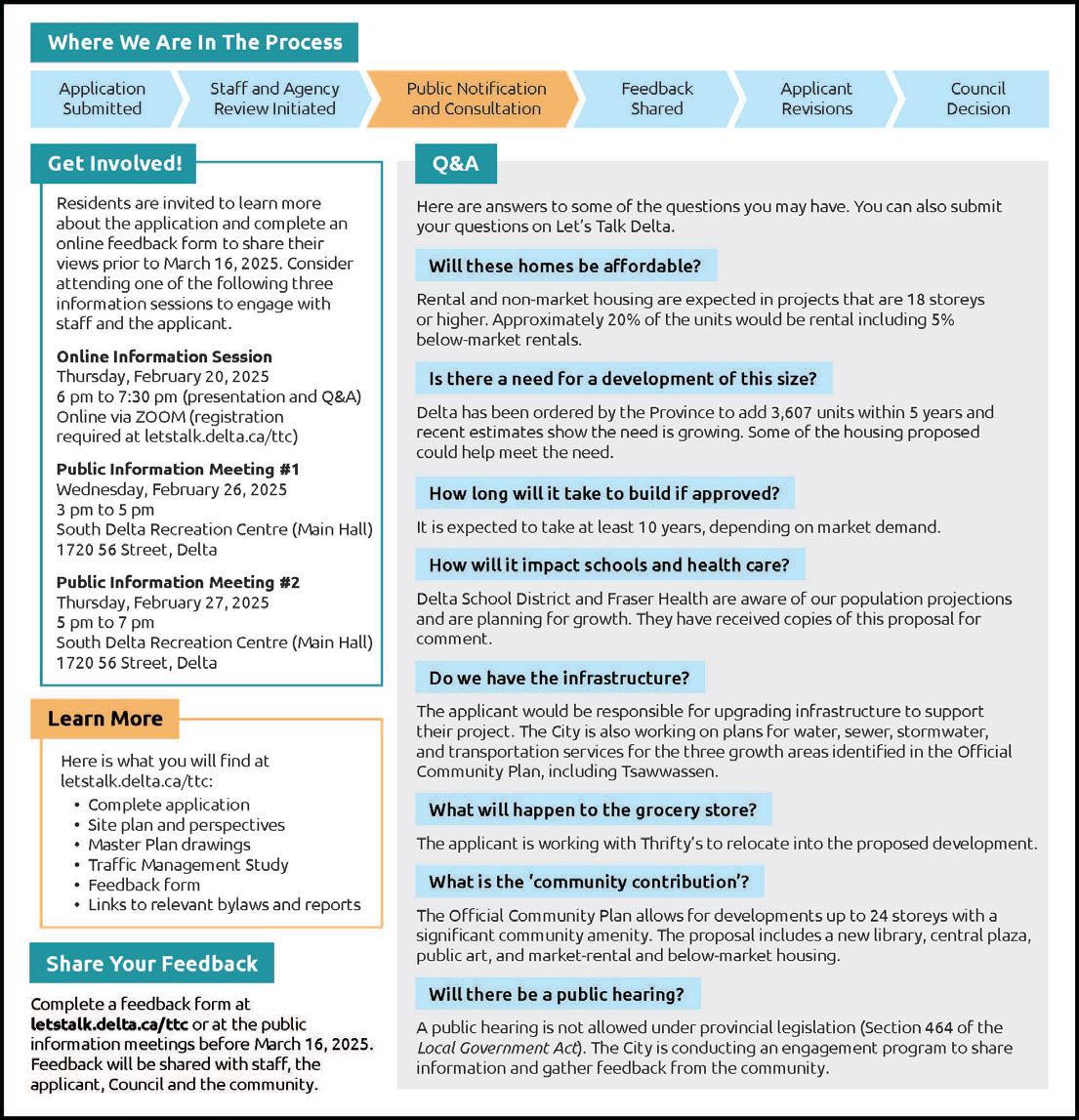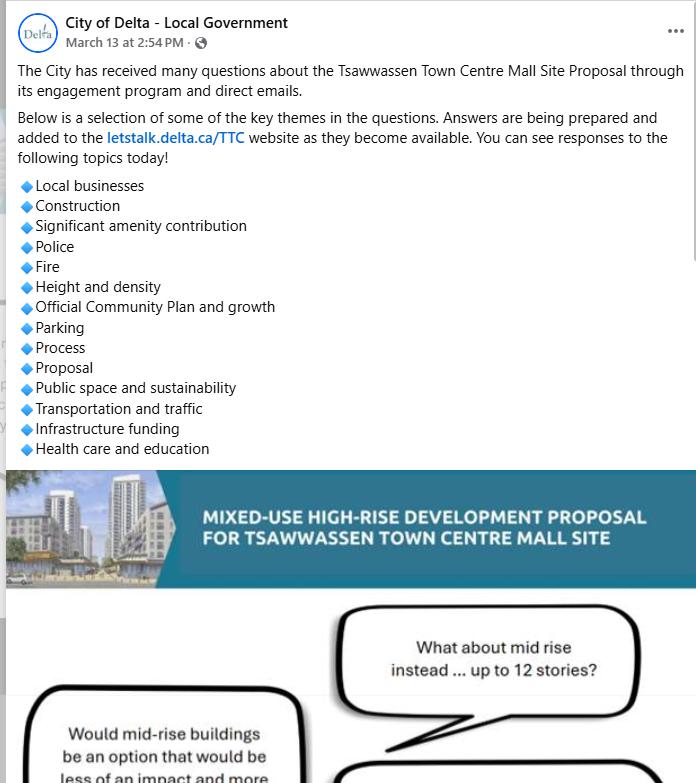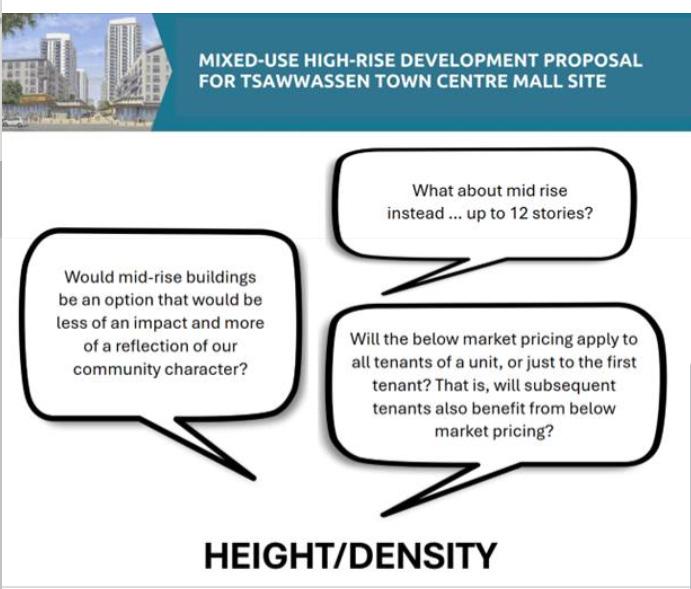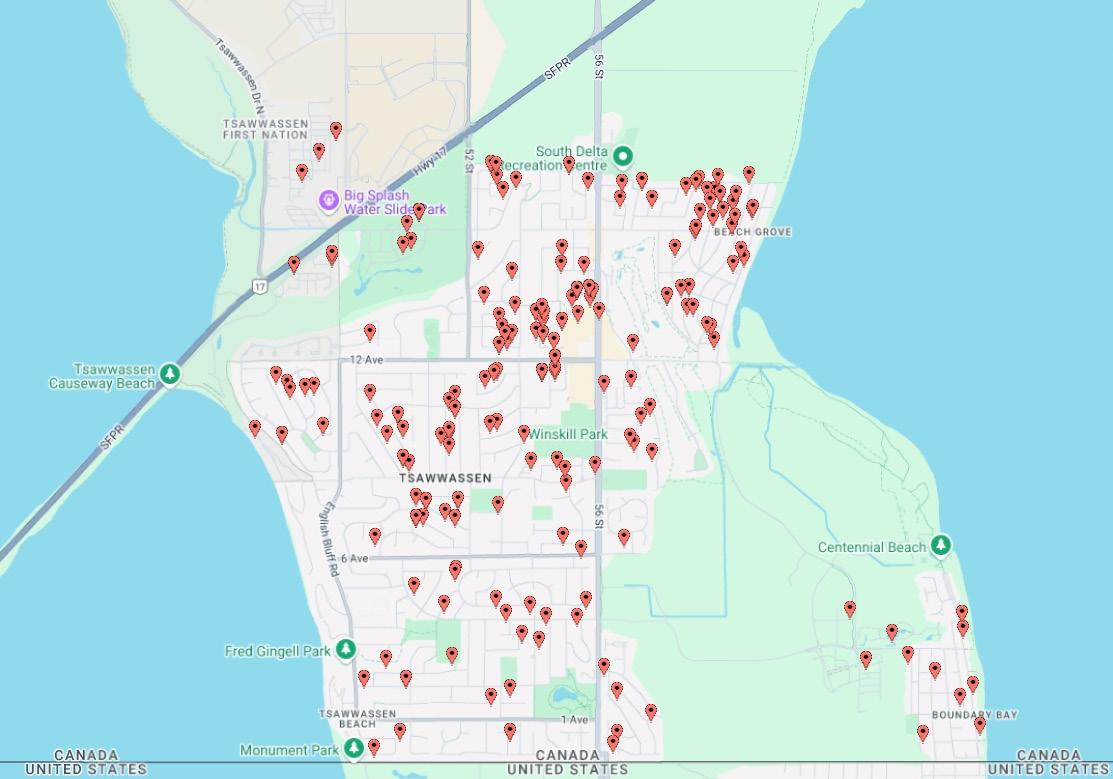2. OUR APPROACH
The following is a summary of the communications and consultation activities performed to support awareness and involvement in the consultation process.
Application Website
A dedicated project website was launched on the City’s engagement platform, Let’s Talk Delta, at the start of the project to provide a central resource for all information about the project and opportunities for involvement. As the project progressed, all supporting materials from the online information session, the open houses displays, and Q&As were available for residents to view.
Mailout
A Tsawwassen-wide mailout was distributed to 12,302 homes and businesses. The mailout summarized the proposal, described the process for considering the application and provided the opportunities for involvement.
Newspaper Advertisements
To support awareness of community members who are not online, the City ran two full-page advertisements in the Delta Optimist as well as the North Delta Reporter providing background and promoting opportunities for involvement.
Social Media
The City leveraged its social media accounts to raise awareness of the application and promote participation. Seven posts were published on each of its main accounts for Facebook and Instagram.
The City of Delta established a dedicated email address at ttc@delta.ca to provide a direct channel for residents to ask questions about the proposal and application.
Online Public Information Sessions
The City hosted one online Public Information Session on Feb. 20. Similar to the in-person format, the applicant also participated. City staff provided a brief presentation on the application and process and the applicant provided an overview of the proposal. The presentations were followed by a Q&A session using the Zoom platform. The one-and-a-half hour session was attended by 253 participants and approximately 260 comments or questions were submitted. Panel members were able to respond to approximately 40 questions. The City prepared a document to provide answers to the main themes of the questions submitted following the event.
The use of the Online Public Information Session format is fairly new to Delta and this was the first time it was used for a development application. The City of Delta invited residents to provide feedback on the format following the meeting. Responses were received from 72 of the attendees, 30% found the meeting very helpful and 39% found it somewhat helpful. Participants like the format and had suggestions for improvements such as more detail around key topics as well as better moderation of the Q&A portion including removal of participants who are not participating constructively.
In-Person Public Information Meetings
Two in-person Public Information Meetings were held to provide opportunities for residents to speak with staff and with the applicant. The meetings were well attended with approximately 350 participants at the first meeting on Feb. 26 and 300 at the second on Feb. 27. Attendees were encouraged to complete a feedback form to formally provide their views on the proposal.
Feedback Form
Between February 4 and March 16, 2025, community members had the opportunity to complete a feedback form online to share their views. Paper copies were also available at the Public Information Meetings. The City received 1,458 feedback forms.
The form served as the formal mechanism for providing feedback on the proposal. Its main focus was to gather thoughts on what residents like and did not like about the proposal, their overall opinion and any additional suggestions.
Representatives from the Tsawwassen First Nation and the City of Delta meet regularly to discuss regional matters including development proposals. Discussions are underway and a summary of their feedback will be provided should the application proceed to be considered by Council.
Tsawwassen First Nation
Departments and Agencies
As part of the review process, staff provided a copy of the application to various internal departments and external agencies. Circulated internal departments include:
• Building
• Community Planning
• Finance
• Development Engineering
• Roads and Transportation Engineering
• Telecommunications Engineering
• Utilities Engineering
• Climate Action and Environment
• Parks, Recreation and Culture
• Lands Management
• Urban Forestry
• Waste Management
• Addressing and Road Naming
• Delta Fire and Emergency Services
• Delta Police
• Social Planning
Circulated external agencies include:
• BC Hydro
• Telus
• TransLink
• B.C. Archaeology Branch
• Delta School District
• Fraser Health
• Transport Canada
• NAV Canada
• Fraser Valley Regional Library
Consultation with internal departments and external agencies has been initiated and is ongoing. Feedback collected through this process will be provided as part of presenting the application to Council for consideration should the applicant wish to proceed.
3. WHAT WE LEARNED
Form
Between February 4 and March 16, 2025, community members had the opportunity to complete a feedback form online to share their views. Paper copies were also available at the open houses. The City received 1,458 feedback forms. The following is a summary of the results. The complete findings can be viewed at letstalk.delta.ca/ttc.
Participants were asked to provide their name, address, postal code and email address as part of completing the form. This information was reviewed to verify residency and to flag any irregular submissions. The following map shows the location of the first 250 respondents. Participation was distributed across Tsawwassen.
Q5: How did you learn about this proposal?
In addition to the mailout, articles in the newspaper and discussions with neighbours and community members were the primary sources of information for participants.
Q6: Some elements of the project that I like include (please select up to 5):
Support for the elements of the project was fairly evenly distributed amongst the options with a higher level of support for the proposed library (32%), the addition of housing (29%), and the support for the local economy (29%). The mobility hub and the design were amongst the least supported of the options and about 1/3 of participants do not see any benefits to the proposal.
Q7: Some elements of the project that I am concerned about include (please select up to 5):
Participants were aligned on the elements of the project they have concerns about with increased traffic congestion (84%), building height (79%) and density (60%), and strain on provincial services (58%) selected the most frequently. Of less interest were affordability of housing units (14%) and capacity of utility services (21%).
Q8: Based on your review of the project information, please select the response that best reflects your current opinion of the proposal (check one):
The majority of participants (73%) are opposed to the proposal as presented and the remaining indicate they support proposal (15%) or have concerns (12%). Those that are in support are a mixture of Tsawwassen residents and participants who do not live in Delta.
Tsawwassen Ladner North Delta Rural I don't live in Delta
Q9: Do you have any additional comments or suggestions regarding the proposed high-rise development?
The following is a summary of the key themes from the comments in support of the proposal and in opposition. The number of times key words related to each theme were mentioned is also provided. Comments that oppose the proposal (1048) offered the following views:
1. Height and Scale Concerns
Respondents felt the proposed 24-storey towers were out of proportion with Tsawwassen’s current character. Comments emphasized that such tall buildings would dominate the skyline, create shadowing, reduce privacy, and significantly alter the aesthetic of the town. Suggestions included limiting building heights to 6–10 storeys for a better fit with the community.
2. Traffic and Road Infrastructure
Comments expressed worries about increased congestion on already limited roadways, especially 56 Street and 12 Avenue. With only two roads in and out of Tsawwassen, people feared gridlock during peak times and emergencies. There were repeated calls for transportation upgrades before approving dense developments.
3. Lack of Amenities and Infrastructure
Respondents questioned whether the area’s basic infrastructure—like sewer, water, parks, and emergency services—could support thousands of new residents. Many argued the current systems are already under strain and need investment before considering developments of this scale.
4. Loss of Small Town Character
A recurring sentiment was that the development would erode Tsawwassen’s “small-town feel.” Residents described the town as quiet, community-oriented, and surrounded by nature, and felt that high-density, urban-style buildings were inconsistent with this identity.
5. Strain on Healthcare and Schools
Concerns were raised about limited access to family doctors, lack of walk-in clinics, hospital overcrowding, and schools nearing or at capacity. Many felt that adding thousands of new residents without expanding these critical services would lower the quality of life for everyone.
6. Opposition to Developer Interests
Some respondents criticized the perceived profit motives of the developer, suggesting the project was driven more by return on investment than community needs. They questioned the adequacy of community contributions and felt the city was prioritizing development over residents.
7. Parking Concerns
Concerns included insufficient parking for both residents and retail customers, as well as the impact on nearby neighbourhoods from overflow parking. Many doubted the proposed number of parking stalls was realistic given Tsawwassen’s car-dependent layout.
8. Environmental and Emergency Concerns
Comments highlighted potential environmental risks, including strain on natural ecosystems, bird collisions from tall buildings, and limited evacuation routes in case of natural disasters. The lack of planning for emergencies was viewed as an oversight.
9. Need for Affordable or Family Housing
Comments emphasized the need for housing that working families and younger residents can actually afford. Some respondents were sceptical that the proposed development would offer meaningful affordability, and instead called for more family-sized units and co-op housing.
10. Consideration of Mid-Rise Alternatives
Instead of high-rises, many commenters proposed mid-rise buildings (6–12 storeys) as a compromise. These were seen as a more appropriate way to add housing while preserving the town’s character and scale. Several comments supported gentle densification over towers.
Comments that support the proposal (135) offered the following views:
1. Support for Increased Housing Supply and Affordability
Respondents expressed strong support for the project due to the urgent need for affordable and diverse housing options. Younger residents, seniors, and those looking to downsize shared personal stories about being priced out of the community. Supporters emphasized that the development could help retain residents, attract new ones, and provide opportunities for intergenerational living.
2. Revitalization and Community Benefits
The project is seen as a chance to rejuvenate the aging town centre, which several commenters described as dated, underused, or an “eyesore.” Comments highlighted the benefits of a new library, a central plaza, improved walkability, and a sense of place. The development is viewed as an opportunity to create a true “downtown” for Tsawwassen with spaces for public gathering, social activity, and local businesses.
3. Efficient Land Use and Smart Planning
Comments supported the vertical density and higher buildings as a responsible way to make better use of the land, aligning with Official Community Plan policies and recent provincial housing legislation. Supporters noted that concentrating density in the town centre preserves surrounding green space and supports public transit and active transportation.
4. Support for Young Families and Local Workers
Comments referred to the lack of housing options for young people and families, which leads to departures from the community. The proposed development is seen as a path to greater equity and inclusion by allowing more people to live near where they work, go to school, or grew up.
5. Acknowledgement of Concerns with Constructive Suggestions
Supporters often acknowledged concerns about infrastructure, parking, and tower height, but argued that these challenges are solvable and should not delay much-needed housing. Suggestions included improving transit service, adding more family-sized units, and ensuring that below-market rentals are high-quality and managed fairly.
Q10: Which part of the City do you live in?
The highest level of participation in the feedback form are participants who indicate they live in Tsawwassen at 86%.
Q11: How long have you lived in Delta?
The majority of respondents have lived in Delta for 21 or more years.
Email Correspondence (ttc@delta.ca)
Staff received 789 emails through the dedicated application email address, including 338 that were also sent to mayor-council@delta.ca. The themes raised in these emails generally align with those summarized from the feedback forms. A review of the emails also revealed some additional themes, which are summarized below.
1. Current Infrastructure Projects
Residents are concerned that current projects to upgrade infrastructure are being completed in support of the Tsawwassen Town Centre application and that the proposed development may impact the existing or newly upgraded infrastructure. Staff clarified that the existing capacity on 56 Street was overdue for an upgrade and is being upgraded in accordance with the projections in the Official Community Plan. Staff also noted that any additional upgrades required to City infrastructure specific to the site would be the responsibility of the developer.
2. Official Community Plan Compliance
Residents requested confirmation of the Official Community Plan (OCP) requirements and if the proposed development is compliant with the land use designation. Staff confirmed that the Official Community Plan allows for developments up to 24 storeys where a significant community contribution is provided.
3. Process and Public Hearing
Residents requested confirmation that a public hearing could not be held in accordance with the Local Government Act and inquired how their feedback was to be included in the process. Staff provided an exerpt of Local Government Act, Section 464 (3) and indicated that feedback sent through the engagement program would be included in a summary report.
4. Housing Requirements
Residents asked about the Housing Target Order and the requirements for housing in Tsawwassen and Delta and why new construction in Tsawwassen First Nation was not being counted. Staff confirmed that Tsawwassen First Nation is a different jurisdiction and not under the authority of Delta. Residents were also provided with reports and studies related to the overall housing crisis and housing needs in the community.
Other
The following provides a summary of additional correspondence and submissions regarding the Tsawwassen Town Centre application and received during the engagement program ending March 16, 2025.
Council Correspondence
Email correspondence sent to mayor-council@delta.ca is managed by the City Clerk’s office in accordance with the guidance provided by the Community Charter. Correspondence sent to mayor-council@delta.ca is provided to each member of Council electronically and in hard copy weekly. Correspondence sent to individual email addresses of members of Council is not managed by the City Clerk’s office.
Petitions
The City of Delta received four petitions related to the application. These petitions are handled by the City Clerk’s Office in accordance with the Council Procedure Bylaw. The petitions are also considered Council Correspondence and are provided to each member of Council electronically and in hard copy weekly.
Petition Title Condition(s) of the Petition
We, The Citizens and Community of Tsawwassen
Petition the City of Delta to Not Approve the Tsawwassen Town Centre Development Proposal (1)
We, The Citizens and Community of Tsawwassen
Petition the City of Delta to Not Approve the Tsawwassen Town Centre Development Proposal (2)
“We the undersigned of this petition, oppose the approval of the City of Delta for the Development. File Number: LU009756. And Should Not Be Approved and deferred to our 2026 Municipal Elections.”
“We the undersigned of this petition, oppose the approval of the City of Delta for the Development. File Number: LU009756. And Should Not Be Approved and deferred to our 2026 Municipal Elections.” 2,806
No Towers in Tsawwassen “We request that the City of Delta denies the current development proposal (File Number LU009754).” 1,158
Dream South Delta “We request the mayor and council of the City of Delta to take the following three actions:
1. Deny the current proposal.
2. Ensure any redevelopment proposal for the site incorporates density metrics of a maximum of 200 residential units per hectare.
3. Ensure any redevelopment proposal for the site incorporates maximum building heights of six storeys.” 1,969
Dream South Delta* “We request the mayor and council of the City of Delta to: deny the current redevelopment proposal for the Tsawwassen Town Centre including the significant community contribution, and explore in depth the financial and operational benefits of including a library in the new design of the Winskill Aquatic and Recreation Centre.” 354
*Received March 24, 2025.
Access to Consultation Results and Other Submissions
The Consultation Report will be presented to Council at an upcoming Regular Meeting. In addition, the complete findings from the feedback forms, the correspondence sent to mayor-council@delta.ca, and copies of the petitions will be compiled into binders and provided to Council for their consideration along with the Consultation Report. The binders will also be available at City Hall for the community to review.
